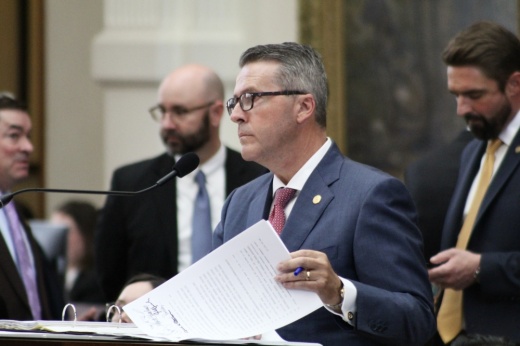At a glance
House Bill 4 would replace the STAAR test with three shorter exams, which would be administered throughout the school year. Lawmakers said this would help educators and parents track student performance over time and alleviate pressure to “teach to the test.”
The proposal would also revamp Texas’ public school accountability system to better reflect how schools serve students, bill author Rep. Brad Buckley, R-Salado, said. The Texas Education Agency recently issued A-F accountability ratings for the 2022-23 school year after a multiyear legal battle delayed their release.
“Make no mistake: this bill does not decrease accountability for our schools. It simply brings it in a fashion that is more responsive and more informative for parents and teachers and families and communities,” Buckley told the House Public Education Committee early on April 30.
The bipartisan committee took up the sweeping assessment and accountability bill around 1 a.m. April 30, during a hearing that began the previous morning. Dozens of Texans waited throughout the day to testify on HB 4 and other legislation.
Committee members unanimously voted to send HB 4 to the full House on April 30, according to Texas Legislature Online. Seventy-five House lawmakers from both political parties are listed as co-authors on the bill, which needs at least 76 votes to pass out of the chamber.
A closer look
“I know that nobody trusts the STAAR test,” Buckley said during the April 30 hearing.
Buckley said that teachers often spend about 18 days, or 10% of the school year, preparing students for the exam, which is typically administered in April.
“When you spend [18] days learning how to do the questions, ... that’s not just bad policy, it’s foolish,” Buckley said. “It’s time to stop that, and it’s time to double down on something that will be meaningful.”
HB 4 proposes giving students three shorter tests: a beginning-of-year assessment in October, a mid-year assessment in January or February, and an end-of-year assessment in May. The bill would require that individual student results be released within 24 hours after each test is administered. STAAR results are made available to families nine to 14 weeks after the testing window closes, according to the TEA.
“One thing that I really appreciate about this bill is that we're looking at growth within the school year, and ... giving educators real-time feedback,” Rep. Gina Hinojosa, D-Austin, said. “Teachers can take that information and actually use it, which they cannot do currently.”
School administrators said it is hard for teachers to use the STAAR test to help students grow throughout the school year, because most results come out over the summer.
“It doesn't help if parents and teachers get feedback after the student has already moved on to the next grade,” Dallas ISD superintendent Stephanie Elizalde told the committee. “Just ask any parent or teacher, and they will tell you that's not accountability.”
More details
The new tests would be norm-referenced, meaning a student’s performance would be compared to that of their peers, rather than being based only on the mastery of certain skills or information. The SAT, ACT and MAP tests are norm-referenced.
HB 4 would direct the TEA to adopt an existing third-party test that meets specific criteria, rather than developing its own exam, like the STAAR. Mary Lynn Pruneda, who leads education policy for the think tank Texas 2036, told the committee she thought the test should be created “on Texas’ terms.”
“We do not need these outside [test] vendors to come in and begin to assess our children on their standards,” Pruneda said April 30.
Lawmakers pushed back against Pruneda’s concerns, arguing that Texas should “get out of the test-making business.” Committee vice chair Rep. Diego Bernal, D-San Antonio, said HB 4 would be a push for “less of a test and more of a tool.”
“I think we can agree that what we have now is insufficient, and [we need to] move to something better, that’s simplified but just as reliable,” Bernal said. “I think there’s a thought, or a fear, maybe, that what we’re doing is watering things down so that schools’ accountability scores improve—that’s not the case.”
Also of note
HB 4 would also update Texas’ school accountability system, which has been frequently criticized in recent years. Over 100 school districts sued TEA Commissioner Mike Morath in August 2023, after he adjusted certain performance indicators that districts said would cause disproportionately lower ratings.
A court case delayed the 2023 A-F ratings for nearly two years, until a state appeals court authorized their release April 3. State data showed campus performance declined statewide between the 2021-22 and 2022-23 school years, with 43% of campuses earning lower ratings in 2023.
The TEA remains blocked from issuing ratings for the 2023-24 school year due to a separate lawsuit, which is pending in the state appeals court.
State law requires the TEA to update the accountability system once every five years, although HB 4 would require legislative approval for major changes. Rule changes would also have to be finalized by July 15 of each year “to ensure stability before school starts”, according to a bill summary from Buckley’s office.
Buckley said the bill would also create an “expedited legal process” for future lawsuits against the A-F system. State senators have discussed legislation that would largely prevent school districts from challenging the TEA’s accountability ratings in court.
HB 4 would also update the accountability system to factor in things like workforce development programs, early childhood education and student participation in extracurriculars when measuring overall student success.
Buckley said these factors are “all directly related to things this body has passed, the governor has said are important, and will drive behavior that will improve outcomes.”
“In my numerous discussions with superintendents and other leaders working on this bill, I've not found a single school leader who does not want to be held accountable, but it's time to rebuild trust in our system,” he told the committee.





